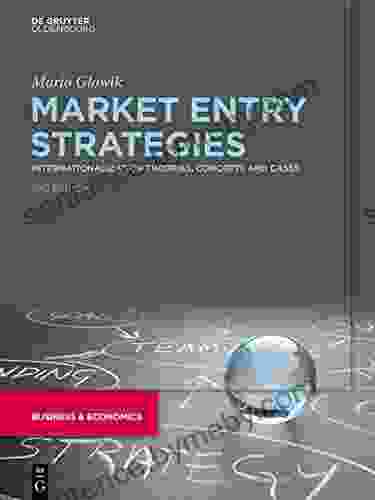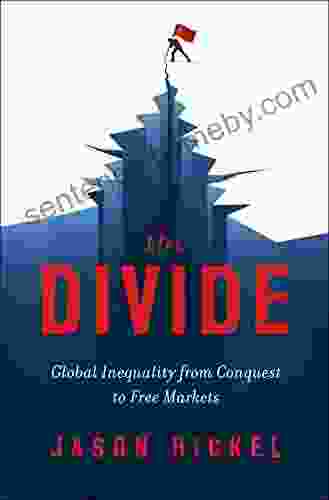Global Inequality: From Conquest to Free Markets

Global inequality is one of the most pressing issues facing the world today. The gap between the rich and the poor has been growing for decades, and it is now at its widest point in history. This inequality is not only a moral outrage, but it also has a number of negative consequences for economic growth, social stability, and environmental sustainability.
4.7 out of 5
| Language | : | English |
| File size | : | 7182 KB |
| Text-to-Speech | : | Enabled |
| Screen Reader | : | Supported |
| Enhanced typesetting | : | Enabled |
| X-Ray | : | Enabled |
| Word Wise | : | Enabled |
| Print length | : | 344 pages |
In this book, I argue that the roots of global inequality lie in the unequal distribution of power and resources between different groups of people. This inequality has been exacerbated by the rise of capitalism and the global free market economy. I conclude by offering a number of policy recommendations to address global inequality and promote a more just and equitable world.
The Historical Roots of Global Inequality
The history of global inequality is long and complex. It can be traced back to the era of European conquest, when European powers seized control of vast territories in Africa, Asia, and the Americas. These conquests resulted in the displacement and enslavement of millions of people, and they also led to the establishment of a global economic system that benefited the European powers at the expense of the colonized peoples.
The rise of capitalism in the 19th century further exacerbated global inequality. Capitalism is an economic system based on the private ownership of property and the profit motive. It has led to great wealth for some, but it has also resulted in widespread poverty and inequality.
The global free market economy, which emerged in the late 20th century, has further accelerated the growth of global inequality. The free market economy is based on the idea that the free market is the most efficient way to allocate resources. However, the free market economy has also led to a number of negative consequences, including increased inequality, environmental degradation, and financial instability.
The Consequences of Global Inequality
Global inequality has a number of negative consequences for economic growth, social stability, and environmental sustainability.
Economic growth: Global inequality can lead to slower economic growth. This is because the poor are often unable to afford to buy the goods and services that they need, which can lead to a decrease in demand and a slowdown in economic growth.
Social stability: Global inequality can also lead to social instability. This is because the poor are often frustrated and angry about their lack of opportunities, which can lead to social unrest and violence.
Environmental sustainability: Global inequality can also lead to environmental degradation. This is because the poor are often forced to live in environmentally hazardous areas, and they are also more likely to be exposed to pollution and other environmental hazards.
Policy Recommendations
There are a number of policy recommendations that can be made to address global inequality and promote a more just and equitable world. These recommendations include:
Increasing investment in education and healthcare: Investing in education and healthcare is one of the most effective ways to reduce inequality. This is because education and healthcare help to increase people's earning potential and improve their quality of life.
Raising the minimum wage: Raising the minimum wage is another effective way to reduce inequality. This is because it helps to ensure that everyone can earn a living wage.
Providing tax breaks for low-income families: Providing tax breaks for low-income families is another way to help reduce inequality. This is because it helps to put more money in the pockets of those who need it most.
Increasing the supply of affordable housing: Increasing the supply of affordable housing is another important way to reduce inequality. This is because it helps to ensure that everyone has a place to live.
Investing in renewable energy: Investing in renewable energy is an important way to address climate change and reduce inequality. This is because it helps to create jobs and reduce the cost of energy.
Promoting fair trade: Promoting fair trade is another important way to reduce inequality. This is because it helps to ensure that farmers and workers in developing countries are paid a fair price for their products.
Global inequality is a serious problem that has a number of negative consequences for economic growth, social stability, and environmental sustainability. There are a number of policy recommendations that can be made to address this problem, including increasing investment in education and healthcare, raising the minimum wage, providing tax breaks for low-income families, and increasing the supply of affordable housing. By working together, we can create a more just and equitable world for all.
4.7 out of 5
| Language | : | English |
| File size | : | 7182 KB |
| Text-to-Speech | : | Enabled |
| Screen Reader | : | Supported |
| Enhanced typesetting | : | Enabled |
| X-Ray | : | Enabled |
| Word Wise | : | Enabled |
| Print length | : | 344 pages |
Do you want to contribute by writing guest posts on this blog?
Please contact us and send us a resume of previous articles that you have written.
 Book
Book Novel
Novel Page
Page Chapter
Chapter Text
Text Story
Story Genre
Genre Reader
Reader Library
Library Paperback
Paperback E-book
E-book Magazine
Magazine Newspaper
Newspaper Paragraph
Paragraph Sentence
Sentence Bookmark
Bookmark Shelf
Shelf Glossary
Glossary Bibliography
Bibliography Foreword
Foreword Preface
Preface Synopsis
Synopsis Annotation
Annotation Footnote
Footnote Manuscript
Manuscript Scroll
Scroll Codex
Codex Tome
Tome Bestseller
Bestseller Classics
Classics Library card
Library card Narrative
Narrative Biography
Biography Autobiography
Autobiography Memoir
Memoir Reference
Reference Encyclopedia
Encyclopedia Lawrence Schiller
Lawrence Schiller Mark Broadie
Mark Broadie Janice Mitchell
Janice Mitchell Jean Brown Wagoner
Jean Brown Wagoner Williams W Scotty
Williams W Scotty Stephen Brennan
Stephen Brennan Julie Sussman
Julie Sussman Larry Semento
Larry Semento Martyn Clifford
Martyn Clifford R R Russell
R R Russell Janice Tingum
Janice Tingum James Geary
James Geary Robert A Baruch Bush
Robert A Baruch Bush Simon Needham
Simon Needham Jay Singh Sohal
Jay Singh Sohal Reginald Fleming Johnston
Reginald Fleming Johnston Janet G Covey
Janet G Covey James Ferguson
James Ferguson Robert H Shumway
Robert H Shumway Jan Wallen
Jan Wallen
Light bulbAdvertise smarter! Our strategic ad space ensures maximum exposure. Reserve your spot today!

 Dashawn HayesThe Busy Toddler's Guide to Actual Parenting: A Blueprint for Navigating the...
Dashawn HayesThe Busy Toddler's Guide to Actual Parenting: A Blueprint for Navigating the...
 Samuel Taylor ColeridgeConundrum Kids: Unveiling the Enigmatic World of Valerio Varesi's...
Samuel Taylor ColeridgeConundrum Kids: Unveiling the Enigmatic World of Valerio Varesi's... Kendall WardFollow ·18.3k
Kendall WardFollow ·18.3k Eric NelsonFollow ·2.3k
Eric NelsonFollow ·2.3k Marcus BellFollow ·18.8k
Marcus BellFollow ·18.8k Dustin RichardsonFollow ·15.2k
Dustin RichardsonFollow ·15.2k Ryūnosuke AkutagawaFollow ·14k
Ryūnosuke AkutagawaFollow ·14k Chinua AchebeFollow ·17.3k
Chinua AchebeFollow ·17.3k Osamu DazaiFollow ·4.3k
Osamu DazaiFollow ·4.3k Melvin BlairFollow ·3k
Melvin BlairFollow ·3k

 Franklin Bell
Franklin BellHow Businesses Can Thrive In The New Global Neighborhoods
The world is becoming...

 Rob Foster
Rob FosterCard Manipulations Volume 1: A Masterclass in Deception...
Unveiling the...

 Enrique Blair
Enrique BlairUnveil the Secrets of Card Manipulation: Dive into "More...
Step into the captivating world...

 Jamal Blair
Jamal BlairComedy Fillers 200 Quips One Liners Jean Hugard
Unlock the Secrets of...

 Chase Simmons
Chase SimmonsUnlock Financial Independence: A Comprehensive Guide to...
In a world where financial security seems...

 Dion Reed
Dion ReedUnveiling Global Market Entry Strategies: A Comprehensive...
Global Market Entry Strategies:...
4.7 out of 5
| Language | : | English |
| File size | : | 7182 KB |
| Text-to-Speech | : | Enabled |
| Screen Reader | : | Supported |
| Enhanced typesetting | : | Enabled |
| X-Ray | : | Enabled |
| Word Wise | : | Enabled |
| Print length | : | 344 pages |







